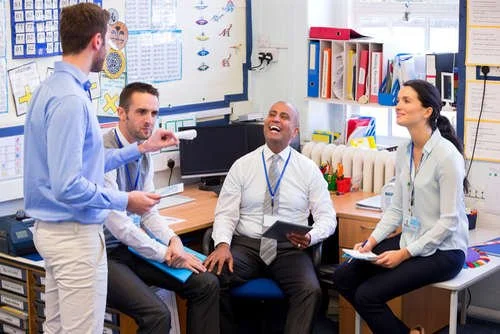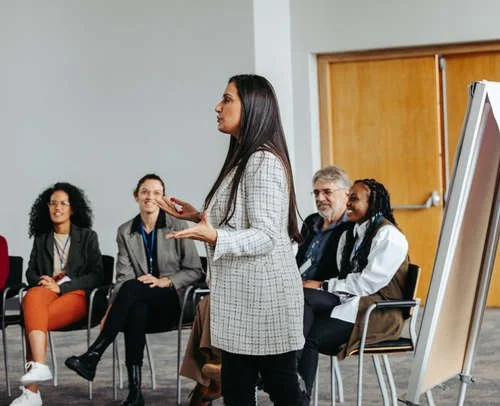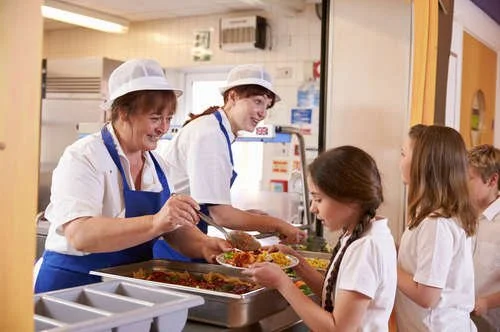Restorative Practices Training for SCHOOL BUILDING ADMINSTRATORS
Supporting principals and building leadership teams in embedding Restorative Practices into daily school life. We help school leaders create strong staff cultures, reduce reactive discipline cycles, and build shared ownership for student success. Training includes easy-to-implement tools, coaching for schoolwide systems, and a phased approach that matches your school's pace and priorities.
Why Restorative Practices Matter in Schools
At Collaborative School Culture, we help school leaders create consistency and connection. Our Restorative Practices training equips building administrators with tools to manage behavior effectively, reduce suspensions, and align staff around clear, relational approaches to discipline. The training is designed to integrate seamlessly with existing systems and resources—so it’s not “one more thing,” but a way to build unity, reduce staff tension, and support a school culture where students and adults thrive.
WHO WE SERVE
-

District Leaders
-

Building Admin
-

Educators
-

School Staff
-

Families

Our Restorative Practices Training Services*
Foundational Restorative Practices Training
This training equips school leaders and staff with shared tools to proactively build relationships and address conflict constructively. Administrators learn how to integrate Restorative Practices into everyday routines—from hallway interactions to discipline systems—so it becomes part of the culture, not one more thing. The focus is on building staff cohesion, supporting teacher buy-in, and reducing student infractions and suspensions.
Restorative Justice Conferencing Training
Prepare identified school staff to lead restorative conferences that respond to harm while preserving relationships and supporting reentry.
Customized Workshops
We offer leadership-specific workshops that help school teams roll out RP in a way that fits their context. Whether you're integrating with existing PBIS frameworks, SEL or behavior response systems, our sessions help you create alignment and momentum among staff.
Parent & Community Training
We offer Restorative Practices training to families alongside you—promoting alignment, shared understanding, and stronger school-family partnerships. These sessions support caregivers in using the same relational tools and language that students experience at school, building trust and reducing conflict.
*Virtual and in-person training options are available
What Sets Us Apart
K-12 Educators with Real-World Experience: We have spent our careers in schools - teaching and leading at the building and district levels. We've lived the challenges, which is why we bring practical, relatable strategies to every session.
Tailored, Evidence-Based Approach: We align with your school’s culture, vision, and priorities—whether you’re strengthening PBIS systems, revising systems that respond to student behavior, or working to build staff cohesion. Every strategy we teach is grounded in research and tailored for your building’s realities.
High-Impact, Engaging Sessions: We know time is tight and buy-in matters. Our trainings get rave reviews. They engage staff in hands-on, energizing learning that builds shared language, addresses resistance, and equips educators with immediately usable tools to strengthen relationships and respond to conflict.
Sustainable Implementation Support: We understand the danger of implementing “one more thing.” We help you build RP into your existing routines and structures—from morning meetings to discipline processes—so it sticks. Our phased approach ensures that change feels doable, aligned, and supported over time.
results from district-wide restorative practices training
over 300 staff reported:
FAQs
-
Over and over, we hear how much educators are moved by our Restorative Practices training. It has just the right balance of learning, reflection, practice, and discussion. It taps into the wisdom and experience educators already have, and it applies to both their professional and personal lives. Restorative Practices training offers educators the theory, methods, resources, and tools to create engaging, caring, and accountable learning environments. Restorative Practices is a transformative approach designed to build a cohesive school community, foster strong relationships, and resolve conflicts effectively- for both staff and students. By equipping educators with these tools, training in Restorative Practices helps bridge gaps between students and staff and between staff and staff, encouraging a supportive and collaborative school milieu.
Definition of Restorative Practices in Education
In educational settings, the definition of Restorative Practices revolves around the science of building community and enhancing interpersonal relationships across all members of the school ecosystem. Originating from philosophies that prioritize the value of direct communication and relationship building, Restorative Practices aim to increase social capital and group ownership. These practices focus on fostering healthy relationships, engaging students and educators in a proactive manner, and include explicit strategies for repairing any harm that arises.
Historical Background and Evolution
The history of Restorative Practices traces back to indigenous traditions that prioritized communal welfare and reconciliation. Over time, these principles have been adapted into modern educational systems as a way to strengthen and evolve from strictly punitive disciplinary models. Historically, educational settings leaned heavily on zero-tolerance policies, which often resulted in a high rate of suspensions and expulsions. The evolution to Restorative Practices involves a paradigm shift toward understanding conflicts and behavior issues as opportunities for learning and growth. Modern educational systems are increasingly adopting these practices as they look for impactful ways to improve school culture, decrease time out of school, and enhance staff satisfaction.
Core Principles of Restorative Practices
Restorative Practices are built on the belief that relationships are at the heart of learning—and when harm occurs, those relationships can and should be repaired. At Collaborative School Culture, we focus on several core principles: calming ourselves before responding, helping others regulate, engaging with high support and high accountability, using Fair Process decision-making, and having clear, explicit strategies to reflect, express, and repair. These restorative processes are integral to repairing harm and building relationships within the community. Unlike traditional discipline, which often focuses on what rule was broken and what consequence is deserved, Restorative Practices ask: Who was impacted? What do they need? And how do we make things right together? This shift in mindset leads to stronger communication, deeper reflection, and a more connected school culture where proactive practices and responsive tools are embedded into the everyday fabric of school life.
-
Restorative Practices training isn’t just a new set of strategies—it’s a mindset shift that helps schools build a strong foundation of meaningful relationships among students, staff, and leadership. The training supports educators in developing and maintaining their “warm-demander” skills by giving them practical tools to build relationships, maintain boundaries, and address conflict without escalating it. It’s also one of the most effective ways to build staff buy-in for adopting Restorative Practices, especially when they see how these approaches make their daily work more connected and manageable.
District leaders and teams play a crucial role in supporting the implementation of Restorative Practices by providing training programs and resources tailored for district needs.
For administrators, RP training offers clear strategies to strengthen relationships with staff and model the same values they want to see throughout the school: voice, accountability, and care. It provides specific tools for preventing conflict, navigating hard conversations, and restoring relationships when things go sideways. When the whole community shares this language and approach, schools shift from reactive to relational—fostering trust, improving culture, and creating a harmonious space where everyone feels supported and heard.
Role in Creating a Harmonious School Environment
The primary objective of Restorative Practices training is to transform schools into more harmonious and productive environments through the development of community-centered strategies. These practices ensure that the school becomes a place of mutual respect and understanding, where relationships are built deliberately to prevent and manage conflicts and where staff and students are held to high expectations with high support and a robust sense of ownership. Restorative Practices are about preventing conflicts before they arise by fostering open communication and understanding among all members of the school community. Additionally, the sustainability of these practices is crucial for maintaining a harmonious school environment over the long term.
Proactive Relationship Building vs. Reactive Conflict Resolution
A key distinction in Restorative Practices is the emphasis on proactive strategies for relationship building, accounting for around 80% of the approach, versus the 20% focused on resolving conflicts. Educators trained in Restorative Practices learn how to nurture relationships before issues occur, which significantly reduces the occurrence and severity of conflicts. The proactive approach encourages educators to create an environment where communication flows freely, and all parties have a greater sense of accountability and ownership and are more inclined to engage positively and constructively. Coaching plays a crucial role in supporting educators in implementing these Restorative Practices effectively, ensuring that approaches are tailored to the specific needs, culture, and resources of the schools and organizations involved.
Statistics on Teacher Retention and School Climate
The importance of Restorative Practices cannot be overstated, especially amidst growing concerns regarding teacher retention, student behavior, and overall school climate. Schools that incorporate Restorative Practices see an improvement in staff engagement, staff perception of the teaching and learning environment, staff perception of admin support and conduct management, and student-teacher relationships. Community and relationship-building strategies inherent in Restorative Practices are proving to be highly effective in preventing teacher burnout and promoting a positive, supportive culture within schools. With statistics indicating a national trend of teachers leaving the profession, investing in Restorative Practices training is seen as an effective measure to counteract this issue. Such initiatives can transform schools into workplaces where teachers feel appreciated and heard, ultimately enhancing retention and promoting a healthier school climate.
-
Restorative Practices (RP) training can vastly transform school culture by shifting the dynamics from punitive to collaborative, fostering an environment where relationships, community, and accountability are emphasized over exclusionary discipline. By equipping educators with the tools to build and repair relationships, RP training encourages proactive engagement and communication among students and staff, leading to a more supportive school atmosphere. This approach has been shown to not only decrease disciplinary issues, suspensions, expulsions, arrests, and out-of-school placements but also enhance the overall school climate, making it a more welcoming place for learning and teaching.
Impact on School Discipline and Student Behavior
The shift from a primarily punitive approach to one grounded in accountability and restoration can profoundly reshape school discipline. Restorative Practices center on student responsibility and relationship repair rather than simply enforcing consequences. When schools move from asking “What rule was broken?” to “Who was impacted and how do we make it right?”, they begin addressing the root causes of behavior. Over time, this shift leads to fewer suspensions, less time out of the classroom, and stronger student engagement.
Research and case studies—including those from Chicago Public Schools and Oakland Unified—have shown that implementing Restorative Practices with fidelity contributes to reduced behavioral disruptions and improved school climate. Careful planning and training are crucial to effectively implement these practices, ensuring that staff are well-prepared to handle conflict, promote emotional regulation, and build stronger relationships with students. Students learn to take responsibility for their actions and engage in meaningful repair, while staff are supported with tools to handle conflict, promote emotional regulation, and build stronger relationships with students. The result? A learning environment where behavior improves not just because of rules but because students feel connected, seen, and empowered to do better.
Case Studies and Research Findings
Significant research, such as studies conducted in Chicago and Pittsburgh, illustrate the transformative power of Restorative Practices in school settings. In Chicago, RP implementation resulted in an 18% reduction in out-of-school suspensions and improved perceptions of school safety and climate. Similarly, Pittsburgh’s schools that employed RP saw a decrease in suspension rates across various student demographics, highlighting the approach’s adaptability and effectiveness in a variety of educational contexts.
These case studies serve as robust evidence of RP’s beneficial impact on school culture, underscoring the importance of adopting these practices not just as disciplinary tools but as integral components of the school ethos. The results indicate that when schools invest in quality RP training and implementation, they foster environments conducive to learning and personal growth for both students and staff. Participants often reflect on their personal and professional growth and the valuable insights they have learned during training sessions.
Testimonials from Training Participants
Educators who participate in Restorative Practices training with Collaborative School Culture often say it’s one of the most impactful professional development experiences they’ve had. More than just learning a new strategy, they leave with a shift in mindset—and practical tools they can use right away. Teachers and staff consistently report feeling more confident managing conflict, building stronger connections with students, and contributing to a more harmonious school culture.
The feedback is overwhelmingly positive. Participants highlight how the training balances real talk with real tools. They appreciate the modeling, interactive activities, and practical frameworks like the Compass of Shame, Engagement Window, and Restorative Questions. These strategies don’t just help with student behavior—they help educators reflect on their own responses and stay grounded in high-accountability, high-support relationships.
Survey results echo what we hear in the room: Participants feel more engaged, supported, and hopeful about their work. Many say it made them deeply reflect on not only how they operate at work but how they interact with their family. When educators feel seen, equipped, and valued, the ripple effects are powerful—and the positive impact on school culture is undeniable.
Note: Participants should be aware that the training requires active engagement and reflection to fully benefit from the experience.
-
Restorative Practices offer clear, practical strategies to strengthen communication, build trust, and foster accountability in schools. Techniques like community-building circles and curbside conversations provide consistent, structured spaces for students and staff to share openly, connect meaningfully, and navigate challenges together. These aren’t just one-off tools—they’re woven into daily routines to create a culture where relationships come first, conflicts are addressed early, and everyone has a voice. When implemented well, these practices help build the kind of school community where students and educators feel grounded, supported, and connected.
Examples of Successful Integration of Restorative Practices
Restorative Practices work best when they’re woven into the daily rhythms of school life—not just pulled out when something goes wrong. One powerful example is the use of circles in classrooms. Whether used for conflict resolution, team-building, or morning check-ins, circles give everyone a structured, consistent space to share, listen, and build trust. They help create a culture where all voices are valued and where students learn to navigate relationships with empathy and accountability.
Schools also see a real impact when they integrate affective statements and restorative questions into everyday communication. These tools give students and staff a shared language to express feelings, reflect on behavior, and consider how their actions affect others. When practiced consistently, these strategies help strengthen school culture, promote emotional awareness, and create a more harmonious, connected learning environment.
Role of Circles
In a practical setting, circles provide a structured yet flexible format for discussion. They can be adapted to various purposes, such as setting agreements, improving engagement, assessing for prior knowledge, resolving conflicts, exploring academic topics, or sharing personal experiences. Typically, a facilitator guides the discussion, ensuring that everyone has a chance to express their thoughts and that the circle is structured, timely, safe, and supportive. Facilitated discussions help maintain engagement and provide feedback to enhance learning outcomes.
Incorporating circles into regular routines helps create a school climate where students feel valued and understood. It allows participants to actively engage in problem-solving and develop emotional intelligence, which is crucial for both personal growth and community development.
Integrating Restorative Practices with Existing Systems
For Restorative Practices to be truly effective, they should be seamlessly integrated with existing frameworks, such as Positive Behavioral Interventions and Supports (PBIS) or the MTSS system. The Restorative Practices continuum is crucial in supporting a positive school culture by balancing proactive Tier 1 relationship-building with the responsive harm repair processes. This integration allows for a more cohesive approach to managing student behavior and promoting positive interactions.
By weaving restorative principles into the PBIS or MTSS framework, schools can create a comprehensive system that supports positive behavior while constructively addressing unwanted behavior. This approach ensures that students learn from their actions and build empathetic relationships with their peers and teachers. Such integration not only enhances school climate but also aligns with the approach to developing social-emotional skills, preventing harm, and addressing student needs.
-
The best Restorative Practices training isn’t just the one nearby or well known—it’s the one that actually fits your school’s needs. Instead of relying on a quick search, connect with experts who’ve led this work in real schools. They’ll help you cut through the noise and find training that’s practical, relevant, and ready to make a real impact on your school culture.
Importance of Consulting Experts Over Online Search
Reaching out to seasoned professionals in Restorative Practices offers depth that a simple search cannot. Experts bring their firsthand experience of implementing these practices in schools, making their insights particularly valuable. They can recommend tailored programs that provide practical tools and strategies to ensure transformational outcomes. At Collaborative School Culture, our trainers have expert knowledge and direct experience in applying Restorative Practices effectively, which can guide your school to achieve its goals. We invite you to request training to engage with our educational offerings and start the journey toward a restorative school environment.
Criteria for Selecting Quality Training Programs
When choosing a training provider, consider their experience and track record with Restorative Practices implementation in educational settings. Look for programs that offer hands-on training and have facilitators with proven expertise in leading school-based initiatives. A quality training program should expand participants’ skills for garnering buy-in, assessing and designing a plan for integration and roll-out, and resources to help get your school jump-started. To experience these benefits, click here to learn more about our training programs.
Testimonials and Reviews as Decision-Making Tools
Another key consideration is the testimonials and reviews from those who have attended the training sessions. Positive feedback from other educators and administrators who have seen real benefits can provide reassurance of the program’s efficacy. Collaborative School Culture’s training has been highly rated by previous participants for its practical application and impact.
Ultimately, consulting with practitioners that have deep experience implementing in schools and relying on validated feedback helps ensure that you invest in a training program capable of making a meaningful difference in your school community. Experienced practitioners play a crucial role in delivering training either in person or online, ensuring that participants receive high-quality, effective instruction.
What our participants have to say:
"I enjoyed the amount of modeling that took place. We were doing circles and practicing the methodology. I also liked that these are tools and strategies that are easily taken back to my space and I can implement a few of them tomorrow."
"The honest and open stories she shared, the neutral questions, the circle explanations, the shame compass, and the With Box. Loved it all. Found worthy and helpful methods of interactions and supporting kids from the first slide to the last one. Amazing."
"The training was informative, engaging, and motivating. I am so eager to begin implementing what I learned both professionally and personally. This is the best training I’ve attended in a very long time."
"It was very interactive. I never felt rushed or that it was too much. I appreciate the facilitator's ability to adapt to the feedback from day 1. She genuinely listened to our needs and wants."
"Great pace; respectful leaders; extremely knowledgeable; safe space to learn and feel like I was valued."
"I loved the engaging activities, the focus on the why of restorative practice, and the collaboration with other staff members. I felt like the depth and variety of the experience was rich."
"Every moment was intentionally spent, and all of the learning was so well-scaffolded and layered."

Ready to Transform School Culture ACROSS THE DISTRICT?
Contact Us Today to Schedule Your Restorative Practices Training and Support!



